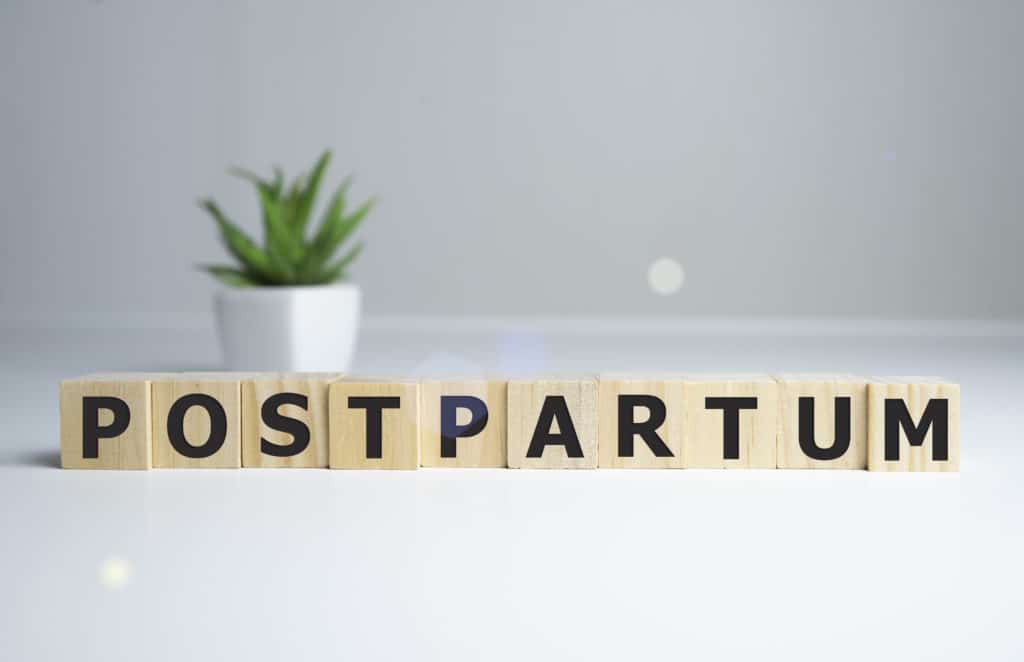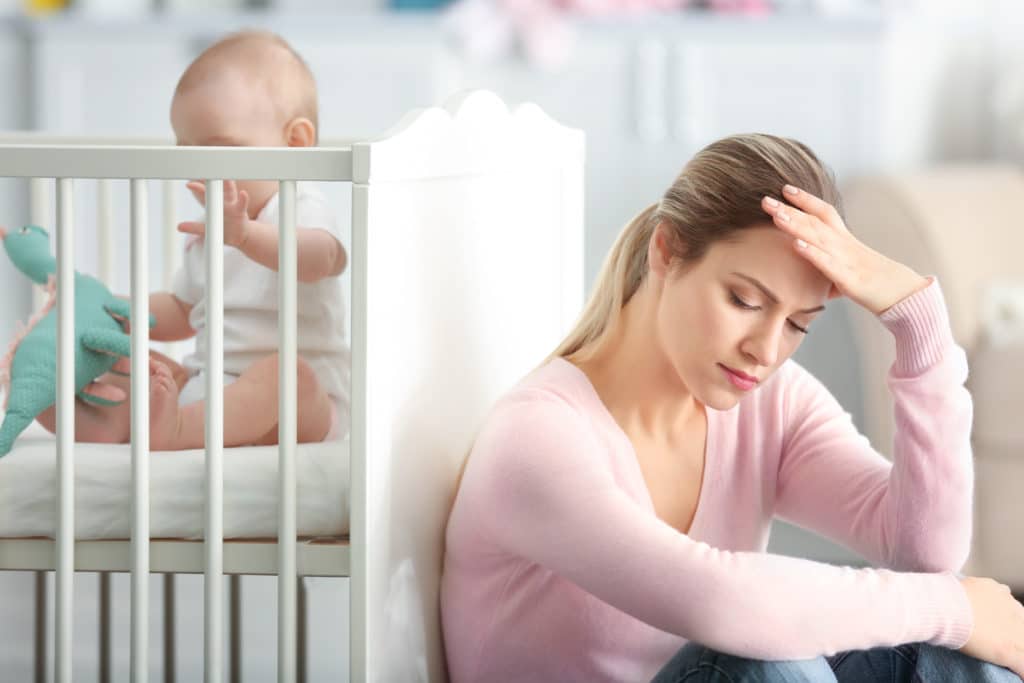What is Postpartum Depression?
Doctors at the National Institute of Mental Health (NIMH) in Bethesda, Maryland are trying to learn more about the causes of, treatments for, and genetic factors in postpartum depression (PPD). PPD develops around the time a woman gives birth. Women with PPD often struggle with anxiety, sadness, difficulty sleeping, or disturbing thoughts. Research suggests that it is triggered by changes in hormones and that women with PPD are sensitive to those changes. PPD occurs in approximately 15% of births. [1]
Postpartum Depression Disorder is a combination of physical, emotional, and behavioral changes that happen in some women after giving birth. PPD is a serious mood disorder that may require treatment.

Women may experience emotional highs and lows, frequent crying, fatigue, guilt, anxiety, and difficulties caring for the baby. It is linked to chemical, social, and psychological changes that happen during and after pregnancy. Postpartum Disorder consists of a range of physical and emotional changes that many new mothers experience. PPD Treatment and recovery time varies, depending on the severity of your depression and individual needs. [2]
How is postpartum depression different from the ‘baby blues’?
The ‘baby blues’ is a term used to describe mild mood changes and feelings of worry, unhappiness, and exhaustion that many women sometimes experience in the first 2 weeks after having a baby. Babies require around-the-clock care, so it’s normal for mothers to feel tired or overwhelmed sometimes. If mood changes and feelings of anxiety or unhappiness are severe, or if they last longer than 2 weeks, a woman may have postpartum depression. Women with postpartum depression generally will not feel better unless they receive the right Postpartum Depression Treatment. [1]

Postpartum Depression Treatment: PPD Signs & Symptoms
Women with postpartum panic disorder suffer from extreme anxiousness and repeated panic attacks. Many women experience the following symptoms after childbirth:
- Trouble sleeping
- Change in appetite
- Severe fatigue
- Lower libido
- Frequent mood changes
Major Depression symptoms that are not typical after childbirth include:
- Isolating from family and friends
- Fear that you are not a good mother
- Hopelessness
- Feelings of worthlessness, shame, guilt, or inadequacy
- Diminished ability to think clearly, concentrate or make decisions
- Loss of appetite or eating much more than usual
- Reduced interest and pleasure in activities you used to enjoy
- Intense irritability and anger
- Recurrent thoughts of death or suicide
- Inability to sleep (insomnia) or sleeping too much
- Overwhelming fatigue or loss of energy
- Restlessness
- Depressed mood or severe mood swings
- Excessive crying
- Difficulty bonding with your baby
- Severe anxiety and panic attacks
- Thoughts of harming yourself or your baby
These fears generally involve dying, losing control, or going crazy.
Types of Postpartum Depression and Postpartum Depression Treatment
Postpartum Anxiety
Another common mood disorder developed after giving birth. Signs of Postpartum Anxiety include:
- Persistent fears and worries
- High tension and stress
Inability to relax
Postpartum Psychosis
Though relatively rare, postpartum psychosis is the most serious form of any postpartum mood disorder. This condition affects approximately 1 in 1,000 women after delivery.
Postpartum Panic Disorder
It is a mood disorder that involves severe levels of anxiety. It occurs in up to 10% of postpartum women. Symptoms of postpartum panic attacks include:
- Shortness of breath
- Tightening of the chest
- Heart palpitations
- Consistent and excessive worry
Postpartum Post-Traumatic Stress Disorder (PPTSD)
It is a unique form of postpartum depression that affects over 9% of postpartum women. Postpartum PTSD trauma may include:
- Birth complications
- The baby being sent to the NICU
- Unplanned C-sections
- Other injuries of childbirth
Postpartum PTSD symptoms include:
- Reliving the trauma in flashbacks and memories
- Avoiding trauma triggers
- Anxiety and panic attacks
- Irritability
- Difficulty sleeping
- Feeling detached or numb to reality
Postpartum Obsessive-Compulsive Disorder (PPOCD)
It is an anxiety mood disorder and affects roughly 3% to 5% of postpartum women.
Causes of PPD
Before finding a Postpartum Depression Treatment, is important to know and evaluate its causes. Postpartum depression is a mental and emotional health condition that affects women after childbirth. Therefore, it is difficult to attribute this condition to one unique cause. Cause of postpartum depression may include:
- Physical changes: In fact, they believed that postpartum depression stems from the drastic hormonal changes that take place during and after childbirth.
- Emotional issues: These types of emotional situations may include complications faced during childbirth. As well as general feelings of being overwhelmed by new motherhood. In addition to this, hormonal changes and sleep deprivation, there are other emotional triggers that can cause postpartum depression. In this case, you may feel less attractive, struggle with your sense of identity or feel that you’ve lost control over your life. Any of these issues can contribute to postpartum depression.
These physical and emotional issues may contribute:
- Hormones
- Lack of sleep
- Anxiety
- Self-image
Postpartum Depression Treatment: Risk Factors from PPD
These factors may contribute to postpartum depression including genetics, environmental, emotional, and physical influences.
- Your baby has health problems or other special needs
- You have twins, triplets, or other multiple births
- You had postpartum depression after a previous pregnancy
- The pregnancy was unplanned or unwanted
- Difficulty breast-feeding
- Family members who have had depression or other mood disorders
- Stressful events during the past year, such as pregnancy complications, and illness or job loss
- Have a weak support system
- With financial problems
- History of depression, either during pregnancy or at other times
- You have bipolar disorder
- You are having problems in your relationship with your spouse or significant other
Postpartum Depression Treatment and Possible Complications
Postpartum depression that is not treated can weaken your ability to bond with your baby, and affect the whole family, so it’s important to look for postpartum depression treatment:
- For mothers: Postpartum depression that is not treated can last for months or longer, even turning into a chronic depressive disorder.
- For fathers: May be more likely to have depression too when a new mother has depression.
- For children: Children of mothers who have untreated postpartum depression are more likely to have emotional and behavioral problems, like sleeping and eating difficulties, excessive crying, and delays in language development.
According to the Centers for Disease Control and Prevention [3]. Having a baby, between birth and six weeks postpartum, it’s important to be aware of postpartum complications and alert your doctor if you experience any of these:
- Cardiomyopathy and heart disease
- Infection and sepsis
- Excessive bleeding (hemorrhage)
- Stroke
- Complications related to substance use disorder
- Cardiomyopathy and heart disease
- Depression and anxiety
Therefore, many postpartum complications can be treated successfully with the Postpartum Depression Treatment, if identified early.
Postpartum Depression Treatment And Prevention
If you have a history of depression, tell your doctor as soon as you find out you are pregnant, or if you’re planning to become pregnant. Firstly, during pregnancy, your doctor can monitor you closely for signs and symptoms of depression. Lastly, after your baby is born, your doctor may recommend an early postpartum checkup to screen for signs and symptoms of postpartum depression.
Here are some tips that can help prevent, or help you cope with postpartum depression:

- Limit visitors when you first go home
- Ask for help
- Rest when your baby sleeps
- Exercise, take a walk and get out of the house for a break
- Expect some good days and some bad days
- Maintain a healthy diet and try to get some exercise every day
- Keep in touch with your family and friends
- Foster your relationship with your partner
- Be realistic about your expectations for yourself and your baby
- Follow a sensible diet; avoid alcohol and caffeine
- Keep the lines of communication open with loved ones
Postpartum Depression Treatment & Therapy
Postpartum depression is treated differently, depending on the severity of the patient’s symptoms. Treatment options include:
- Anti-anxiety or antidepressant medications have a direct effect on the brain.
- Psychotherapy can help you make sense of destructive thoughts and offer strategies for working through them.
- Participation in a support group for emotional support and education.
Most importantly, in the case of postpartum psychosis, medicines used to treat psychosis are usually added. Hospital admission is also usually necessary. If you are breastfeeding, don’t assume that you can’t take medication for depression, anxiety, or even psychosis.
Postpartum Depression Treatment for psychosis can challenge a mother’s ability to breastfeed. Separation from the baby makes breastfeeding difficult, and some medications used to treat postpartum psychosis aren’t recommended for women who are breastfeeding. If you’re experiencing postpartum psychosis, you may need a doctor who can help you work through these challenges.
Reclaim your life with Postpartum Depression Treatment
Postpartum Depression is a condition that can cause major health, social, and family problems that should not be taken lightly. We Level Up Treatment Center can provide you, or someone you love, Postpartum Depression Treatment with professional and safe care. Feel free to call us to speak with one of our counselors. We can inform you about this condition by giving you relevant information. Our specialists know what you are going through. Please know that each call is private and confidential.